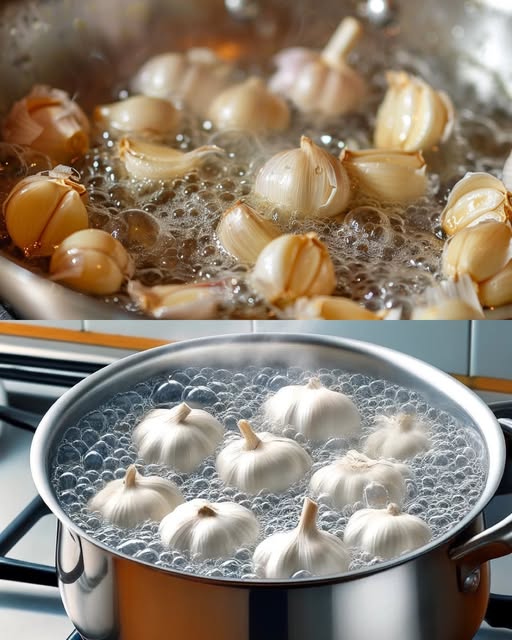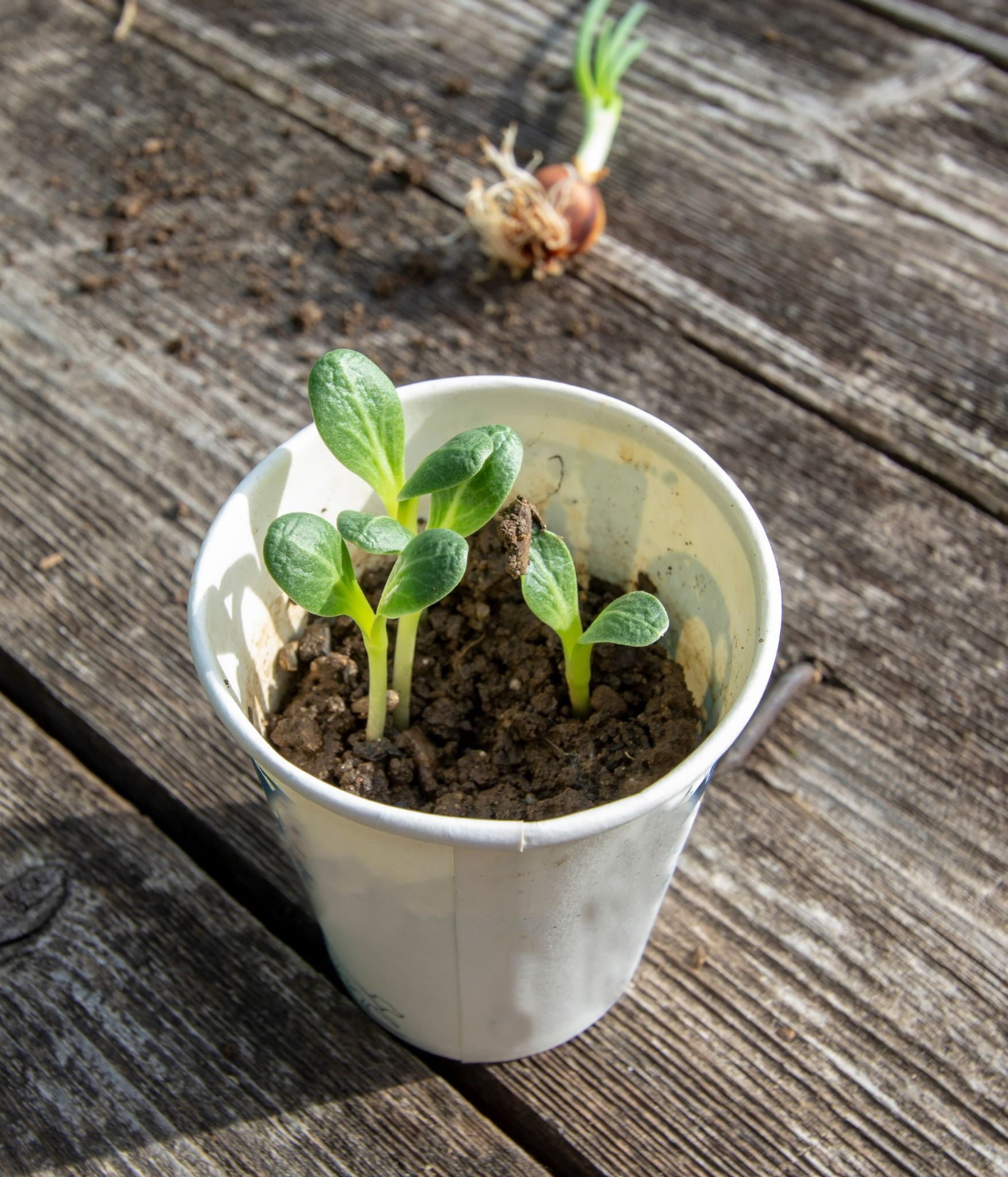You love your plants, but they’re constantly under attack by harmful insects? Instead of using chemical pesticides, why not try a natural and safe solution? Thanks to its insect-repelling and antifungal properties, garlic can become your best ally for a healthy, flourishing garden. In just a few simple steps, you can make a highly effective homemade spray to protect your plants from pests and diseases.
A Simple, Natural Recipe for a Protective Spray
What you will need:
- 5 cloves of garlic (unpeeled)
- 350 ml of water
- 2 tablespoons of liquid black soap (optional, for better adhesion)
Want to make a larger quantity? Just double the amounts!
How to Prepare Your Garlic Spray?
- Infuse the garlic: Place the garlic cloves in a saucepan with 350 ml of water. Bring it to a boil, then let it simmer for 10 minutes. This will release the active compounds in the garlic.
- Let it cool and strain: Once the solution has cooled, strain it to remove the garlic pieces, leaving you with a pure solution.
- Add liquid black soap (optional): This step helps the spray adhere to the leaves for longer-lasting protection.
- Transfer to a spray bottle: Your solution is now ready to use!
How to Apply Your Spray Effectively?
- Shake the bottle before use to properly mix the solution.
- Spray it on the leaves and the soil around your plants.
- Apply regularly (every 3-4 days or after rain).
- Indoor Use: This spray is great for keeping ants and aphids away from your indoor plants!
Why is Garlic So Effective Against Pests?
- A natural insect repellent: Aphids, beetles, and mosquitoes all hate the smell of garlic.
- A powerful antifungal: It combats diseases like powdery mildew and black spots.
- Safe for the environment: Unlike chemical pesticides, this spray protects without harming bees or pets.
- Economical and easy to prepare: With everyday ingredients, you can create an effective protection solution without spending a fortune.
Tips for Maximum Protection
- After rain: Reapply the spray to maintain its effectiveness.
- Garlic cloves in the soil: Plant a few garlic cloves around your crops for long-lasting protection.
- Combine with other natural methods: Coffee grounds or nettle manure complement the repellent action of garlic beautifully.
A Healthy, Natural Garden
Making your own garlic spray is a simple, natural, and environmentally friendly way to protect your plants. Whether you have a vegetable garden, a flower-filled balcony, or indoor plants, this effective solution will help you keep your plants healthy without resorting to chemicals.
So, are you ready to try this eco-friendly trick for a thriving garden?
Additional Benefits of Garlic in the Garden
Garlic, aside from its insect-repelling properties, is also known for its ability to improve the soil. It contains compounds like sulfur and allicin, which can help improve soil structure, and it may even boost the growth of certain plants when used as a companion plant. If you plant garlic next to certain crops, it can help keep away pests that would otherwise damage your vegetables and flowers. Furthermore, garlic is known to be a good deterrent for certain fungi, which can damage your crops, making it a powerful all-around garden remedy.
When you use garlic as a preventive measure against pests and diseases, you’re not only helping to preserve the plants you love but also contributing to a more sustainable gardening practice. It’s a win-win situation: your garden stays healthy, and you reduce the need for harmful chemicals that can pollute the environment.
Understanding the Power of Garlic’s Active Compounds
Garlic owes its effectiveness to the active compounds it contains. When you crush or chop garlic, it releases a compound called allicin, which is responsible for its pungent smell and many of its health benefits. Allicin acts as a potent natural repellent against insects and pests, making it an excellent natural pesticide.
In addition to allicin, garlic also contains sulfur compounds, which are known to be antifungal agents. These compounds help protect your plants from fungal diseases like powdery mildew, a common problem for many gardeners. The sulfur also helps to enhance the immune system of your plants, making them more resistant to various threats.
Garlic and Plant Health: A Symbiotic Relationship
Garlic’s ability to improve plant health goes beyond pest and disease control. Its natural properties can help to improve the overall vitality of your garden. For example, some studies suggest that garlic can help to enhance the growth of certain crops, such as tomatoes and carrots, by improving soil health and providing nutrients. Its antifungal and antibacterial properties help to keep the soil clean, which in turn supports healthy plant development.
In addition, garlic can be a great companion plant. By planting garlic next to crops like roses, tomatoes, or fruit trees, you can naturally ward off common pests like aphids, caterpillars, and spider mites. The strong smell of garlic confuses the insects and keeps them away, allowing your plants to thrive without the need for chemical intervention.
Practical Considerations for Using Garlic Spray
While garlic spray is an effective solution for most garden pests, it’s important to note that it may not work for every type of insect. For instance, some larger insects like beetles may not be as affected by garlic’s smell as smaller pests like aphids. In such cases, it’s a good idea to combine the garlic spray with other natural methods like neem oil, diatomaceous earth, or insecticidal soap to ensure comprehensive protection.
Also, while garlic is safe for most plants, it’s always a good idea to test the spray on a small section of your plant before applying it widely. Some plants, especially delicate ones, may be more sensitive to garlic and could suffer damage from prolonged exposure.
Creating a Multi-Pronged Approach to Pest Control
One of the great advantages of using garlic spray in your garden is that it can be easily integrated into a larger, holistic pest control strategy. Combining garlic with other natural pest control methods allows you to tackle different types of threats in your garden. For example, using garlic in conjunction with companion planting (where you plant certain plants together to benefit from their natural pest-repelling qualities) can provide even more effective protection.
You can also consider adding herbal teas made from mint or basil to your pest control routine. Both herbs are known to have strong insect-repelling qualities, and when used alongside garlic, they can form a powerful defense system against a wide range of garden pests.
The Environmental Impact of Garlic Spray
One of the biggest advantages of using garlic spray over chemical pesticides is its low environmental impact. While conventional pesticides can harm beneficial insects, pollinators like bees, and even the broader ecosystem, garlic spray is safe for the environment. It is non-toxic to animals and insects that are not pests and will not leave harmful residues in the soil. By using a garlic-based solution, you’re helping to preserve the health of your garden’s ecosystem.
In a world where sustainability is becoming increasingly important, natural gardening methods like garlic spray represent a proactive step toward reducing the harmful effects of chemicals on our planet. By adopting these natural solutions, you’re not only protecting your plants but also contributing to a more sustainable future for our environment.
Conclusion: The Power of Garlic in Your Garden
Incorporating garlic into your gardening routine is an easy, cost-effective, and environmentally friendly way to protect your plants from pests and diseases. By creating your own garlic spray, you can keep your garden free from harmful chemicals, ensuring a healthier environment for both your plants and the creatures that share your space. So, why not give garlic a try in your garden? It could just become your new best friend in the fight against pests!





